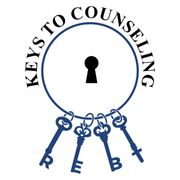REBT Counseling in Tampa: 5 Rational Self-Help Strategies for Improving Your Mental Health & Wellness

“People and things do not upset us. Rather, we upset ourselves by believing that they can upset us.”
- Albert Ellis
At Keys to Counseling in Tampa, FL, I specialize in a specific type of therapy called Rational Emotive Behavior Therapy (REBT). Established by Dr. Albert Ellis in 1955, REBT is an active, directive, solution-focused, and goal-oriented approach to counseling and it is recognized as the pioneering form of Cognitive Behavioral Therapy (CBT).
REBT is a psycho-educational therapeutic model that aims to empower individuals and couples by targeting irrational beliefs that negatively impact their emotions and behaviors. Over the course of our work together, I strive to provide all of my clients with a deep understanding of REBT philosophy, so that they can effectively follow their progress based upon the map that we construct together for the duration of our counseling journey. While REBT is deeply rich in therapeutic information, acronyms, and concepts, below I have summarized the five most fundamental concepts in REBT. By successfully implementing these ideas into your daily life, you will notice unparalleled progress and improvement within your psychological, emotional, and behavioral well-being!
1. Take Emotional & Behavioral Responsibility
People, my partner, adversities, life events, and even my own poor decisions do not have the power to upset me: they only give me the opportunity to become or not become emotionally activated (i.e. upset).
I can decide not to upset or emotionally/behaviorally disturb myself, and I do this by choosing to change the way that I think about the various challenges that will inevitably arise in my lifetime (and in my relationships), and ultimately choose to think rationally, which will help me to experience healthy emotions and engage in helpful behaviors.
2. Distinguish Preferential Desires from Dogmatic Demands
STOP MUSTURBATING! STOP SHOULDING ON YOURSELF!
Emotional health comes from desiring and striving for excellence, success, control, respect, love, and approval, but NOT stubbornly demanding that your preferences must or should be met at all times!
As human beings, we have many personal desires and wishes, but very few actual and absolute needs. Demandingness (i.e. musturbating and shoulding) leads to emotional and behavioral disturbance.
When we surrender our demands, as well as our other irrational beliefs (awfulizing/catastrophizing, frustration intolerance, and global ratings of self-worth, others’-worth, and life-worth), we learn how to live more mindful, rational, and happier lives!
3. Cultivate Unconditional Self, Other, & Life Acceptance
All human beings have the capacity to think irrationally, to experience unhealthy emotions, and engage in unhelpful behaviors. We all make mistakes, and life in general is not perfect.
With this realistic assessment of human fallibility and the world’s imperfections in mind, I can choose to adopt an attitude of unconditional acceptance towards myself, others, and the world. This does not mean that I cannot acknowledge and penalize bad behavior, mistakes, and traumatic events; rather, I will accept the reality that people and life are not perfect, and therefore, I can choose not to emotionally and behaviorally disturb myself about this reality.
I can experience healthy negative feelings (i.e. profound concern, sadness, and annoyance) in response to disappointing circumstances, without becoming emotionally disturbed by unhealthy negative feelings (i.e. anxiety, depression, and anger).
4. Develop Uncertainty, Discomfort, Frustration, & Life Tolerance
While I strongly dislike uncertainty, I can live well in spite of it. Even though there is the potential for me to not succeed at times, I am able to take calculated risks to accomplish my goals, and I can tolerate the uncertainty.
While physical and emotional discomfort/frustration are often tough to handle, I am capable of tolerating my feelings of discomfort and frustration that are essential to achieving my goals.
While I strongly prefer life to be fair and comfortable, I acknowledge the reality that life is uncertain and often not fair. I will accept the inevitable challenges that arise in life, and I will focus my attention on that which is within my power to change, and not upset myself over adversities and events that I do not have the ability to change. I will tolerate the circumstances in life that I strongly desire to be different, but that I cannot control, and I can experience some happiness in spite of my difficulties.
5. Live to Enjoy Yourself: Not to Prove Yourself
Through unconditional self-acceptance, I will live to enjoy my life, as opposed to irrationally demanding that I must/should/ought to/have to/need to prove myself to anyone.
I will take responsibility for my own emotional and behavioral reactions in life; therefore, I can make my own decisions (without seeking approval from others), and I acknowledge that I am accountable for the outcomes of my choices.
I understand that I can better maintain my mental health and wellness by actively seeking out social and emotional connections to others, as well as sustaining passion for interests/hobbies that I enjoy.
Even when it is difficult, I will find something (small or large) to be grateful for in each day. Gratitude is an attitude through which happiness is derived!
At Keys to Counseling in Tampa, Florida, my mission is to promote healthy living through rational thinking! I provide both individual and couples counseling, and I would be honored to cognitively, emotively, and behaviorally accompany you on your journey to living, loving, being, and staying better!
Written by Jaclyn Hall, Founder of Keys to Counseling in Tampa, FL
If you are ready to take a positive and empowering step into your future, reach out to Jaclyn Hall at Keys to Counseling for a truly life-changing approach to individual and couples counseling. Call her office today at (813) 397-8099 for a free phone consultation!
About the Business
Have a question? Ask the experts!
Send your question

